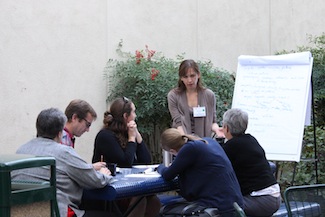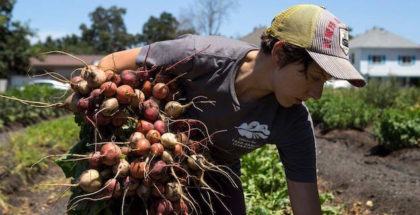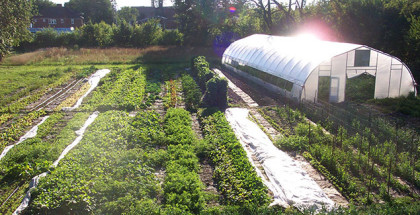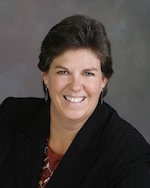New UC Riverside Enterprise Crosses Disciplines to Improve Local and Global Food Production Systems
February 24, 2016 | AJ Hughes

Participants at a California Agriculture and Food Enterprise planning workshop discuss its future goals and aims. (photo courtesy Don Davidson/University of California, Riverside)
With a strong emphasis on research, the California Agriculture and Food Enterprise (CAFE) at the University of California at Riverside has a mission to improve food production systems, stimulate food and agriculture teaching and develop an interdisciplinary food systems curriculum.
Drawing upon the expertise of faculty and staff from UCR’s College of Natural and Agricultural Sciences, University of California Extension and Agricultural Experiment Station, CAFE aims to link with people from other UCR colleges and departments who work in areas pertaining directly or indirectly to agriculture.
“[CAFE] transcends a single discipline,” says CAFE founder and genetics professor Norman Ellstrand. “People in social sciences are interested in food deserts.”
He stresses that CAFE’s work also includes non-food issues, such as ornamentals, turf grass, climate change and more.
CAFE is very much a part of the City of Riverside’s thriving local foods movement. Ellstrand and other CAFE members are part of the Riverside Food Systems Alliance, and Ellstrand is looking forward to UCR hosting the upcoming 3rd Annual GrowRIVERSIDE Conference: Cultivating the Future on March 21 – 22.
Ellstrand is keen on Riverside restaurants that embrace local food and farmers. The Salted Pig, a Riverside restaurant that serves an array of local foods, created snacks for CAFE’s kickoff event. Ellstrand would like to see Riverside restaurants with such a local focus gain more visibility.
“I went to a horticulture meeting in New Orleans, and there was a stack of handouts showing restaurants that serve local produce,” he says. “Why can’t we do that in Riverside?”
While Ellstrand feels that local food production is extremely important, he views the local foods scene as falling under a large umbrella. For example, Parliament Chocolate in Redlands, California is committed to artisan chocolate making, using only organic cane sugar and high-quality cacao. With a focus on strong relationships, owner Ryan Berk procures cacao beans and sugar directly from farmers. Even though its raw products are not sourced locally, Ellstrand sees its end-product as a locally-produced food.
Similarly, Ellstrand takes a wide approach when it comes to solving problems that relate to agriculture—and includes people from a wide variety of university departments to achieve that goal.
This diversity shows when one takes a look at the roster of CAFE Planning Committee and Food Network members. Included are professors of history, economics, gender and sexuality studies, sociology, biomedical sciences and anthropology, along with an array of staff members and students.
Ellstrand also takes a long view regarding CAFE’s relationship to Riverside and the Inland Empire. CAFE will work closely with the University of California Global Food Initiative, which focuses on innovative and sustainable ways to feed the world. In addition, he acknowledges CAFE’s important role in helping to combat California’s ongoing drought.
Food and agriculture issues impact the entire world, however, and Ellstrand hopes CAFE can take what it learns from local and statewide efforts across the globe.
“Local problems are associated with global problems,” he says.
Ellstrand’s wife, Tracy Kahn, serves on the CAFE Planning Committee and is curator of the UCR Citrus Variety Collection. Together, they attend international citrus conferences, and he’s always amazed at how many UCR graduates he encounters at these events.
“UCR has long arms already in terms of international agriculture,” says Ellstrand. He envisions CAFE enhancing these efforts even more through interdisciplinary and innovative research that is relevant locally and internationally.
UCR recently approved CAFE as an official university entity with a primary mission of research. Ellstrand is eager to get started.
“Our goal is to get researchers on board, along with avocado farmers, policymakers, engineers and scholars,” he says. “We’ll get to know each other. Our goal is to create real relationships, and tackle big and interesting questions in agriculture.”













Submit a Comment